SCHOOLS OF THE FUTURE
A new breed of schools opens the doors of science and technology for township pupils
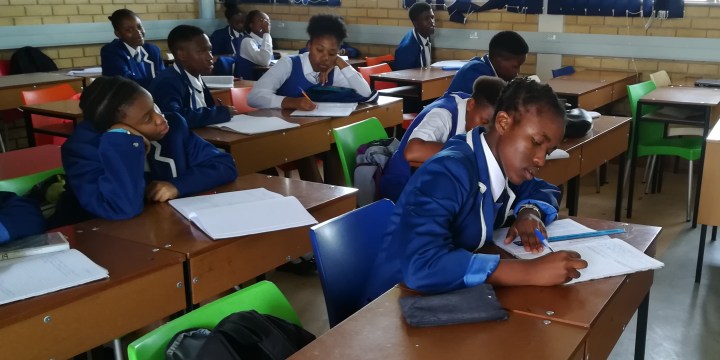
In 2016, Gauteng Education MEC Panyaza Lesufi opened the Curtis Nkondo School of Specialisation. It is one of six specialisation schools opened by the Gauteng Department of Education. Daily Maverick visited the school over two days to see how a speciality school operates.
It’s Thursday morning and maths teacher Allen Selota is delivering what seems to be an ordinary mathematics lesson. He presents the lesson to a chattering and excited Grade 9 class. Gone is the dusty chalkboard, in its place a smartboard. The learners use foldable laptops, which they refer to as tablets. There are a few textbooks scattered on some of the learners’ tables, but these are not being engaged with as much as the tablets.
Situated in a township called Emndeni, south of Soweto, the Curtis Nkondo School of Specialisation secondary school is named after Struggle icon Curtis Nkondo. Learners can specialise in Engineering Graphics and Design (EGD), IT, and mechanical, civil, or electrical engineering.
“One of the requirements is that our learners must not only learn pure content. In addition to content, they must have projects that are related to subjects they are doing,” says school principal Lindiwe Ndzala.
Steve Mabona, spokesperson for the Gauteng Department of Education, says the department looked at school systems in Europe, Asia and the United States.
“One finds this approach has been applied successfully to the nurturing of top talent. An example of this is the US La Guardia High School of the Arts. It is renowned for developing top talent and has around a 99% completion rate (compared with 77% across the rest of the US),” Mabona said.
Even among the educators, an emphasis is placed on the practicality of the education provided at the school in relation to content. The department selects existing public schools and implements the speciality programme as a way of turning them around.

Njabulo Shabangu a grade 12 learner at Curtis Nkondo School of Specialisation explains how a motor vehicle engine operates. Photo: Ayanda Mthethwa
“The overarching goal for the Gauteng Department of Education is to improve the performance of all schools within the province. Schools of Specialisation are an accelerator in achieving this. The Gauteng Department of Education also aims to not only repurpose schools, but to optimally use existing resources,” Mabona says.
Curtis Nkondo English teacher Ruth Nielson told Daily Maverick that their learners are also exposed to the outside world.
“They go on trips; speakers from various fields visit and present workshops about specific subjects. Township children are very township-based and so often they are not exposed to the outside world. They have no picture of what the world looks like out there, and what chances they have and who they could be,” Nielson says.
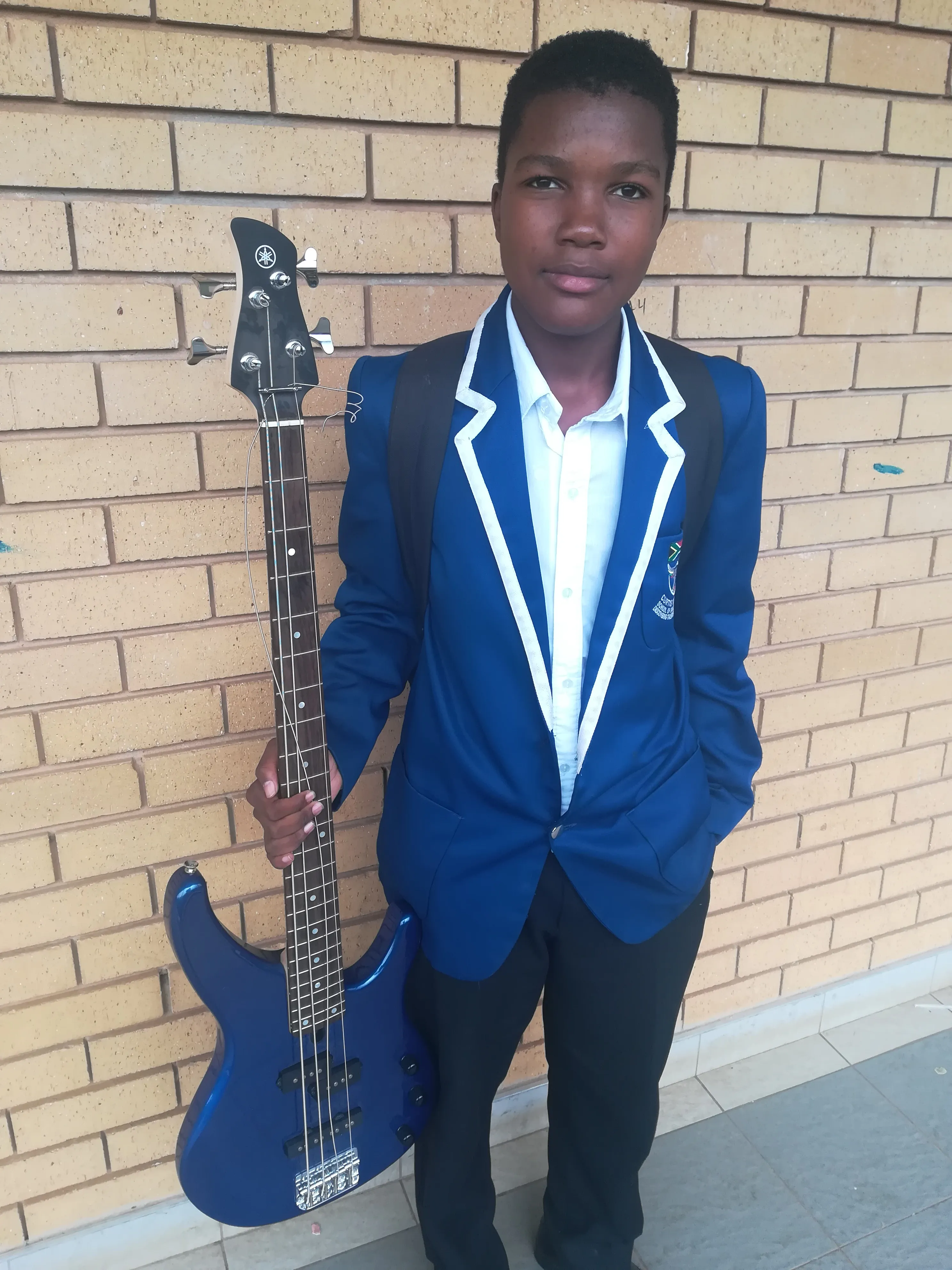
A learner at Curtis Nkondo School of Specialisation poses with a bass guitar before a music class. Photo: Ayanda Methethwa
In order to be admitted to Curtis Nkondo, prospective students apply through online. If their marks meet the criteria, they are invited to write an aptitude test.
Initially, when the school opened in 2016, it had just two grades. Prospective Grade 9 learners were hand-picked by the department and placed at Curtis Nkondo based on their academic excellence, while prospective Grade 8s were chosen by their educators in the primary school. They then wrote an assessment facilitated by Sci-Bono, a Stem (science, technology, engineering and maths) Centre in Johannesburg.
Grade 9 student, Katlego Mosele, explains the process of becoming a learner at the school:
“The top 10-performing learners were given forms and I happened to be one. The forms were from Curtis and we had to fill them in. We were told we must go write a test on a Saturday. The test was constituted of English, mathematics and natural sciences. Each section of the test was out of 20 marks. Before we wrote the test, we were told that we must obtain 80% and above to be admitted,” Mosele said.
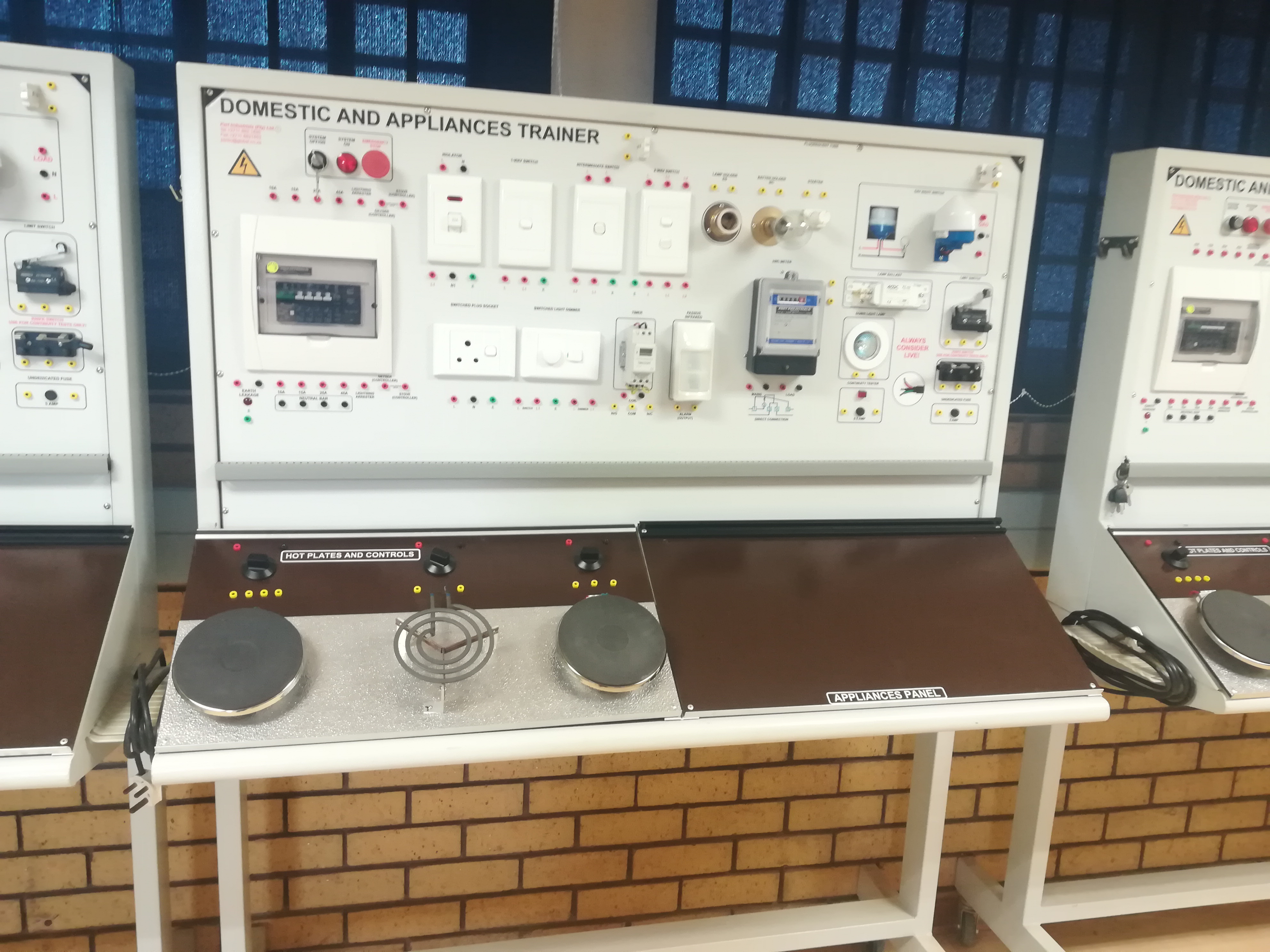
A domestic and appliances trainer that is used by learners during an electrical engineering class. Photo: Ayanda Mthethwa
However, according to Ndzala, the school has had to adjust its admission percentage in cases where almost all learners fail the aptitude test.
“Unfortunately, the intake for 2018 did not do very well in the assessment. There were only two learners who got 80% and above. So we had to lower our admission percentage. Initially, we had said we were going to admit learners who obtain at least 60%, but we had to lower it to 45% for 2018.
“This year several of them passed the assessment and got 80% and above, but still we could not get the 150 learners we were looking for, so we had to lower our standard again to 48%,” Ndzala said.
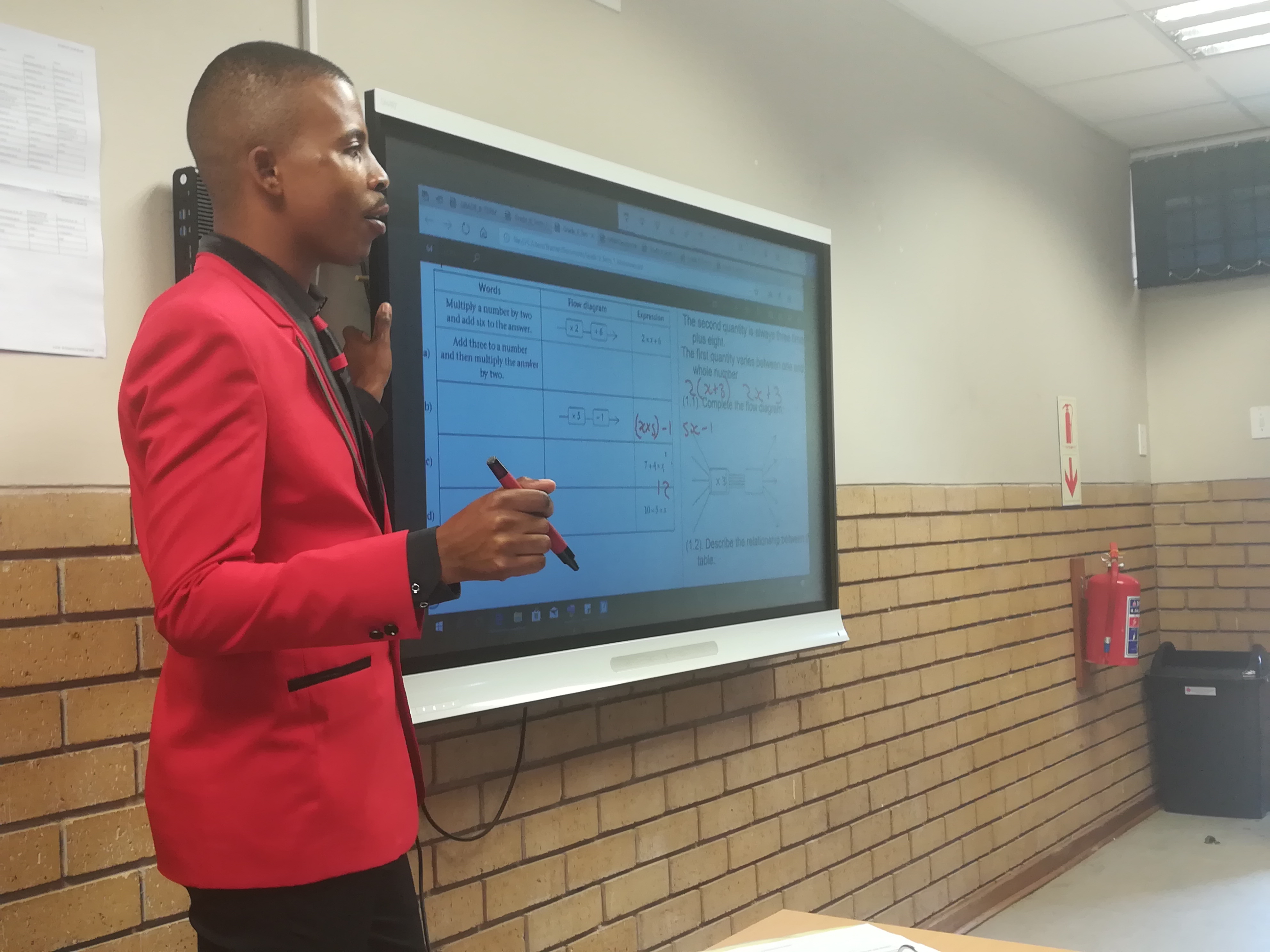
Allen Selota, a mathematics teacher at Curtis Nkondo School of Specialisation in Soweto delivering a lesson to grade nine learners. Photo: Ayanda Mthethwa
When asked whether lowering the admission mark affects the school’s targeted pass rate success, Ndzala said:
“It does, but not so much. I would say the majority that is doing very well is a positive influence on the handful that is not doing well, so we find that at the end of the year we do not have too many learners failing”.
The majority of the learners Daily Maverick spoke to said the test was not difficult, and English was the only problematic section for them.
“The test is not that difficult. You just don’t know what to study, but it’s not bad. It constituted of the things that we learn in Grade 7, but English was challenging,” said Lesego Ngakane.
Another learner, Mahada Mulalo, said:
“For me, the test was not difficult. I found it easy except for English. Maths was also challenging, but overall it was okay.”
The International Monetary Fund recently released a working paper that identified language as one of the learning barriers in schools.
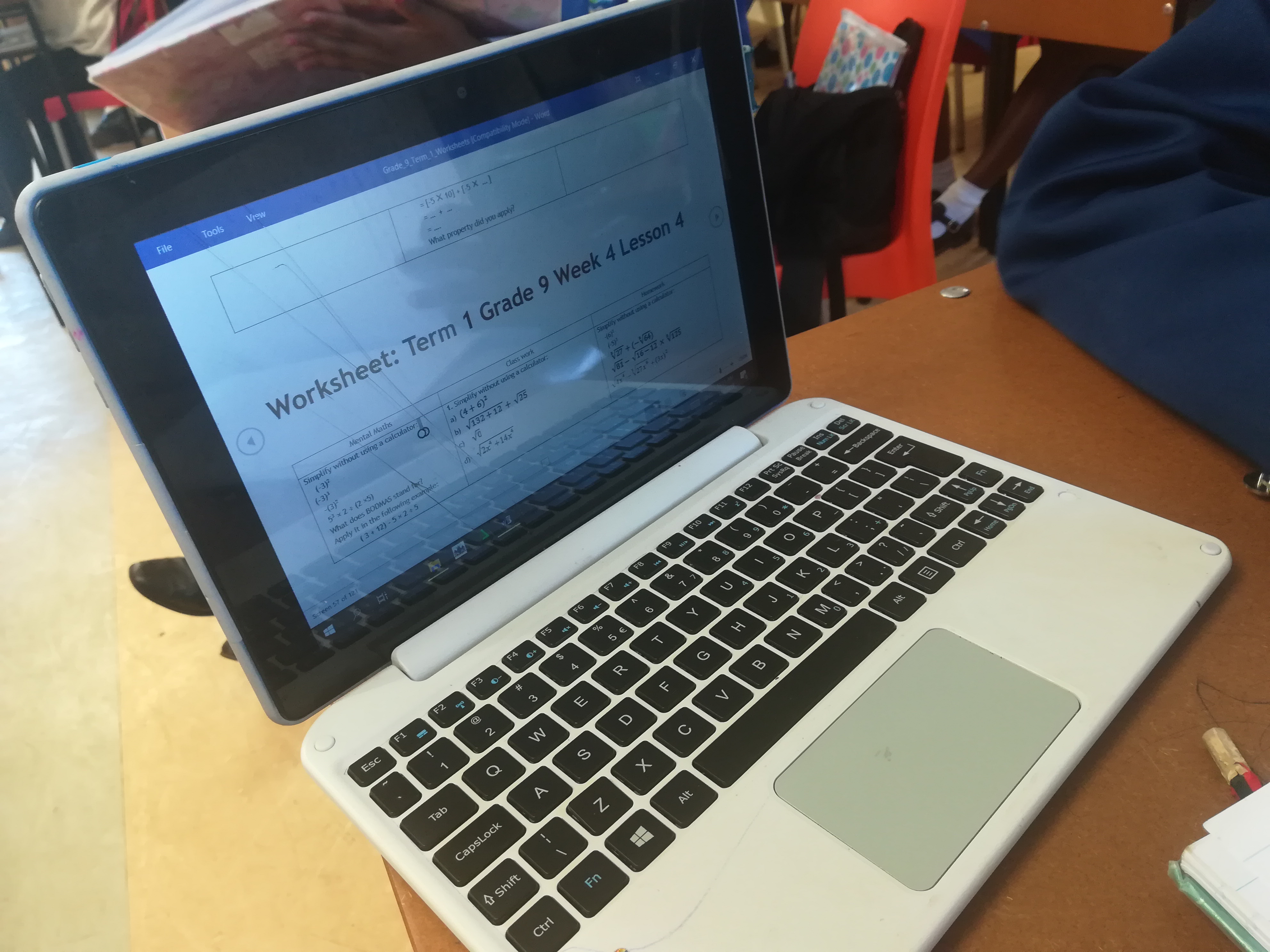
The foldable tablet used by all learners at Curtis Nkondo School of Specialisation to access textbooks, worksheets and internet for research purposes. Photo: Ayanda Mthethwa
The paper, Struggling to Make the Grade: A Review of the Causes and Consequences of the Weak Outcomes of South Africa’s Education System, tackles various reasons why the country’s education system seems to be failing.
According to the paper, “a majority of South African learners, predominantly black, do not have a good command of the language English even though English is the primary medium of instruction in schools”.
Ndzala told Daily Maverick that “initially the assessment was done by Sci-Bono, but over the past two years the school has taken the initiative of designing the assessment with the assistance of external bodies”.
The school has identified poor scores in the mathematics and science sections of the assessments. They have put measures in place to help students who struggled with writing the aptitude test.
According to Ndzala, “in Grades 8 and 9, six hours per week is devoted to mathematics to close gaps identified. All learners are registered in the Siyavula online programme which deals with maths in Grades 8 and 9 as well as maths and science in Grades 11 and 12,” Ndzala told Daily Maverick.
Since the school offers speciality subjects, the facilities and resources that learners and educators use should speak to this need.
Each subject in the trades has a workshop area: One each for civil, mechanical and electrical engineering. The school also has two computer labs for IT, and three science laboratories. Daily Maverick visited the mechanical and electrical engineering workshops.
With surveillance cameras installed at the school, the safety of the facilities can almost be guaranteed. The exercise of obtaining, maintaining and keeping safe these facilities must come at a hefty cost, especially since Curtis is a no-fee-paying school.
Ndzala said they were heavily reliant on government funding, but it is not enough:
“Right now, all the subjects have a practical component, where you must buy additional resources. Currently, we cannot buy resources for the technical department because we no longer have money,” Ndzala said.
In 2016, when the Gauteng Department of Education and the Information Technology Association of South Africa announced the roll-out of these speciality schools, they said the programme would cost R7-billion, Engineering News reported at the time. Of this, R5-billion would come from government funds and the remaining R2-billion would be raised through private sector co-operation and investments.
Thando Ngozo and Sibusiso Mntantato, senior researchers at the Financial and Fiscal Commission, told Daily Maverick that “if schools of specialisations’ curricula and programmes are aligned to skills needed, additional financial resources should not be a problem at all as the private sector would be willing to provide funding as it also benefits from schools of specialisation graduates”.
Ndzala said the school can seek funding from the private sector, but so far they had been unsuccessful:
“Nowadays companies are not so keen on donating cash to schools. They would rather have something like a partnership with the school.”
For a specialised school to function, the educators need to have a specialised set of skills.
The International Monetary Fund paper alluded to teacher subject-content knowledge as a contributor to the failing system.
“While South African teachers are well-compensated by international standards, they have lower subject-content knowledge than their peers in SSA (sub-Saharan Africa) countries. Indeed, they are even sometimes outperformed by learners they are supposed to be teaching,” the paper said.
So, do the educators speak to the needs of the school?
“The first group of educators who opened the school were hand-picked by the department. But over the years, since 2017, 2018 and 2019 [they] are now following the normal recruitment process. What is general about them is that 80% have an honours degree and some are registered for masters, or a second honours degree. It was made a requirement that you must have your junior degree, but have intentions of getting more knowledge in your subject area,” said Ndzala.
One of the aims of rolling out the specialisation schools’ programme is to narrow the gap of skills shortage in South Africa.
Mabona told Daily Maverick that “schools of specialisation will contribute toward addressing the critical skills shortages in South Africa by nurturing the system’s most talented learners, and also to expand learner opportunities within the system and post-matric, especially learners from economically disadvantaged communities”.
Ndzala said there are students who have been promised a job placement, post-matric.
“Toyota has indicated that they might be taking five of our learners at the end of the year for a learnership and eventually a job. This initiative came through the networking of the Head of Department for Technical Subjects. The agreement is that the school should send the names of five top-performing learners in September,” said Ndzala.
Even though the department is aiming at improving schools in economically disadvantaged communities, Ngozo and Mtantato expressed their concern that this programme could aggravate inequalities in the public basic education system.
“It is important to note that schools of specialisation could easily create a two-tier education system, whereby there are schools of specialisation with extra funding and non-specialist schools which do not benefit from extra money, thus exacerbating and perpetuating inequalities in education,” they said.
When Daily Maverick asked some of the learners what they thought differentiated their school from schools that did not specialise, almost all agreed there was no difference. They said it lay in the learners’ attitude towards education.
Njabulo Shabangu, a Grade 12 learner, said:
“I don’t think there is much of a difference. It is all dependent on the learner and the determination that they have. But we are at an advantage because learners from other schools do not have the intense practical resources and experience that we have.”
Another told Daily Maverick that “our school is not so different”.
“There are schools around Soweto who use smartboards and tablets just like we do. It is still the same as attending a normal school. The only difference for me is that we are not overcrowded in class. There are few of us in class and that makes it easy for the teacher to engage with us,” Kgauhelo Hlahane said.
Learners are not only exposed to educational content, but they also have extramural activities such as sports, cultural activities, music, peer-tutoring and coding. From Grade 9, coding becomes a compulsory activity that learners must take up.
What became apparent during this visit is the complete dedication of learners and teachers to education. The eagerness to learn was entrenched in every learner I spoke to.
Nielson told Daily Maverick that the school has become a beacon of hope in the community. Primary school learners from around the area are motivated by Curtis Nkondo and the possibility that they could also form part of the school if they work hard enough.
The Gauteng Department of Education will convert a total of 35 schools into schools of specialisation. The other five schools that have already been opened are Mohloli Secondary School, Magaliesburg School of Specialisation, Phelindaba Secondary School, Edward Phatudi Comprehensive School of Specialisation and Rhodesfield School of Engineering. DM
Ayanda Mthethwa is a Daily Maverick intern.


















 Become an Insider
Become an Insider